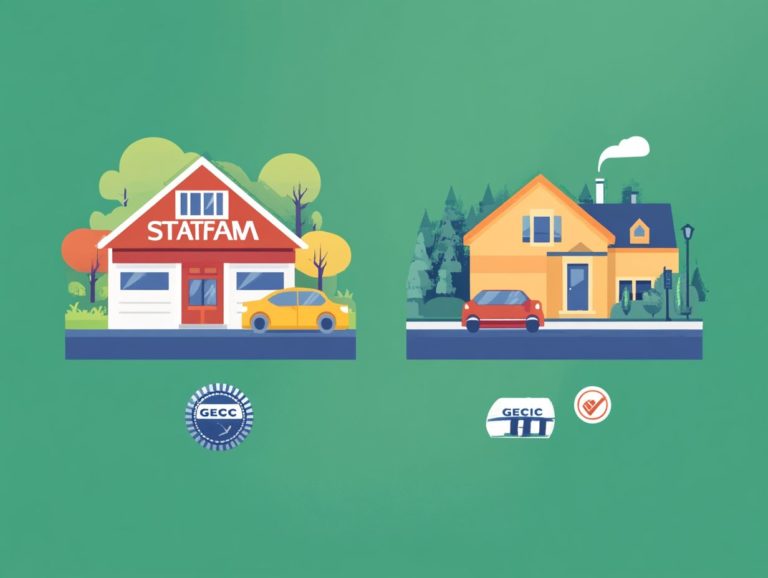5 Questions to Ask Your Insurance Agent
Navigating the realm of insurance can feel daunting, yet grasping your coverage needs is vital for your financial well-being.
This article highlights fundamental questions to pose to your insurance agent, from identifying the necessary types and amounts of coverage to understanding the various factors that influence premiums.
Whether you’re in pursuit of discounts, seeking guidance on filing a claim, or wishing to explore ways to lower your costs, this information will empower you. Stay sharp and make sure you re fully covered!
Contents
Key Takeaways:

- Understand the types of insurance coverage you need to protect yourself and your assets.
- Determine the appropriate amount of coverage for your specific needs to avoid being underinsured.
- Factors such as your age, driving record, and credit score can impact your insurance premiums.
1. What Types of Insurance Coverage Do I Need?
Understanding the different types of insurance coverage is essential for anyone looking to secure their financial future. Different policies cater to unique circumstances and help you achieve specific financial goals.
Auto insurance is a vital consideration, providing protection against damages from accidents, theft, or natural disasters. This is particularly important if you rely on your vehicle for daily activities and commuting.
Liability coverage further safeguards you against potential financial repercussions from injuries or damages to third parties. This makes it crucial for both homeowners and business owners.
By assessing these insurance types and their associated benefits, you can better prepare for your living situation and effectively reduce risks. This ensures peace of mind when faced with unexpected challenges.
2. How Much Coverage Do I Need?
Determining how much coverage you need is crucial for aligning your insurance policy with your financial goals while ensuring your loved ones are adequately protected.
To calculate your coverage requirements, evaluate several key factors. Start by assessing existing debts, such as mortgages, personal loans, or credit card balances that must be settled if you pass away.
Consider future liabilities, like your children’s education expenses or ongoing household support, as these are significant in creating a robust financial plan. Knowing how much death benefit you need is essential. This amount ensures your dependents stay financially stable should you no longer be there.
By considering your employment benefits and savings, you can create a clear picture of your insurance requirements, ensuring you’re well-protected against unforeseen circumstances.
3. What Factors Affect My Insurance Premiums?
Several factors influence your insurance premiums, including your risk level, medical status, and the specifics of your policy. All these elements contribute to your overall costs.
Age plays a significant role in determining your rates; younger individuals typically enjoy lower premiums compared to older adults due to perceived longevity and health stability. The results of any health examinations can also affect your premiums; those reflecting better health usually benefit from lower costs. Your lifestyle choices, such as smoking or engaging in high-risk activities, can significantly impact what you pay.
Gathering multiple insurance quotes is extremely helpful. It not only provides insight into premium rates but also allows you to compare deductible costs, making it easier to choose the plan that best aligns with your needs.
4. What Discounts Are Available?

Want to pay less for insurance? Discover the discounts waiting for you! Exploring available discounts can significantly reduce your insurance costs. It s essential to grasp how premium discounts and multi-policy discounts can ease your financial stress.
For instance, many insurers offer multi-policy discounts that reward you for bundling your home and auto insurance together. This creates a truly advantageous situation. Safe driving discounts are also often available, encouraging responsible behavior on the road and allowing you to enjoy lower rates for maintaining a clean driving record.
A strong claims history can benefit you, as some companies recognize that fewer claims indicate less risk, ultimately leading to potential savings. With such a plethora of options at your disposal, it s wise to consult directly with your insurance agent.
They can provide personalized insights and help uncover all available discounts tailored specifically to your unique circumstances.
5. How Do I File a Claim?
Filing a claim doesn t have to be scary. Let s simplify the process together! Your first step is to gather all relevant documents, including your policy details, incident reports, and receipts. This information is crucial for evaluating your claim.
Next, it’s essential to reach out to your insurance agent. They are your guiding light, providing insights tailored to your specific policy and helping you navigate those initial steps with ease. For more information, check out the 5 most common questions about New Jersey auto insurance.
Take the time to understand your insurance company s requirements. Be sure to note submission deadlines and any specific forms needed to avoid unnecessary delays.
Lastly, be mindful that additional expenses, such as deductibles (the amount you pay out of pocket before the insurance kicks in) or repair costs, can emerge during the claim process, potentially affecting the final compensation you receive.
What Are the Different Types of Insurance Policies?
Different types of insurance policies serve distinct purposes and protect against a variety of risks. It s essential for you to understand the nuances between them. This includes life insurance options like term insurance and permanent insurance, as well as auto insurance and liability insurance.
Life insurance primarily ensures financial security for your loved ones in the event of an untimely death. Term insurance provides coverage for a specific duration, while permanent insurance offers lifelong protection and the potential for cash value accumulation.
For vehicle owners, auto insurance is crucial; it covers damages caused to your car or others in cases of accidents and theft. Meanwhile, liability insurance plays a vital role in protecting you from claims due to accidents or damages you cause.
By grasping these various policies, you can tailor your coverage to meet your specific needs and manage potential risks with confidence. Take a moment to review your insurance policies today and speak with your agent to ensure you re fully covered.
What Are the Most Common Insurance Claims?
Understanding the most common insurance claims gives you the power to prepare for potential challenges. Ensure you have the right liability coverage and auto insurance to tackle unexpected situations.
When you familiarize yourself with claims related to auto accidents, you can better assess the limits of your coverage and explore additional options, like collision or comprehensive insurance. On the flip side, homeowners’ claims cover damages from natural disasters or theft, making it crucial for property owners like you to evaluate your policies to avoid the pitfalls of underinsurance.
Health insurance claims arise from various medical treatments, highlighting the importance of understanding co-pays and deductibles.
By grasping these key aspects, you can navigate the complexities of filing claims with confidence and mitigate potential out-of-pocket expenses, ultimately ensuring peace of mind when the unexpected occurs.
How Can I Lower My Insurance Premiums?

Lowering your insurance premiums is entirely achievable through various strategies. Collaborating with your insurance agent can help you fine-tune coverage limits and explore available discounts.
One highly effective method is to increase your deductibles. A deductible is the amount you pay out of pocket before your insurance kicks in. This can lead to a significant reduction in your monthly payments.
By opting for a higher deductible, you agree to shoulder a larger out-of-pocket expense should a claim arise. This trade-off can result in substantial savings over time.
Embracing healthier lifestyle choices can also improve your health-related risks. This may translate into lower premiums for your health insurance. Implementing safety measures, such as installing smoke detectors or security systems, can mitigate risks and earn you discounts on home insurance.
Don’t overlook the premium discounts available to you. Bundling multiple policies or showcasing a safe driving record can further amplify your savings. Don’t wait! Take action now to reduce your premiums and save money.
What Are the Risks of Not Having Enough Insurance Coverage?
Not having enough insurance coverage can be a financial nightmare! It leaves you vulnerable to significant risks that threaten your financial security.
Imagine facing a sudden medical emergency, where hospital bills soar, and you have barely enough coverage to manage these costs. Or picture a homeowner whose property has been devastated by fire, only to discover that their policy covers just a fraction of the repair expenses.
Consider the implications of someone getting injured on your property. Inadequate liability coverage could lead to legal fees and settlements that far outstrip what you can handle. These scenarios underscore the urgent need to evaluate and ensure you have sufficient coverage for unexpected yet common events.
How Often Should I Review My Insurance Coverage?
Regularly reviewing your insurance coverage is essential to ensure it aligns with your needs as an insurance holder. Your financial goals and life circumstances evolve over time.
As you navigate various life stages whether it’s starting a family, purchasing a home, or advancing in your career it’s crucial to reassess your existing policies. Changes like an increase in income or the addition of family members often mean your current coverage may no longer suffice.
Health changes can also influence the type of policies you should maintain. For example, receiving a new diagnosis might require you to consider more comprehensive health coverage.
By making these annual or event-triggered reviews a priority, you can adapt your insurance strategies to better reflect your evolving personal and financial landscapes.
What Questions Should I Ask When Comparing Insurance Policies?
When you’re comparing insurance policies, asking the right questions is key. This helps you gain clarity on coverage limits, costs, and specific benefits tied to each option. For a comprehensive approach, consider following these 5 simple steps to review your insurance policy.
It’s crucial to grasp how premium rates are determined and what factors might influence them. This includes your personal risk profile. Don t hesitate to inquire about the claims process. Find out how easy it is to file a claim, the average turnaround times, and what documentation you ll need to provide.
Also, don’t overlook the terms of policy renewal; they can significantly impact your long-term financial planning. Engaging with an insurance agent can offer you tailored insights. Additionally, following 5 tips for understanding your insurance policy can clarify these points and deliver personalized recommendations aligned with your unique needs.
Frequently Asked Questions

What insurance coverage is essential for me?
This will vary depending on your specific needs and situation. Generally, it is recommended to have health insurance, car insurance, homeowners or renters insurance, and life insurance at the very least.
Talk to your insurance agent today to review and improve your coverage!
What factors can affect my insurance rates?
Insurance companies consider several factors when determining your rates. These include your age, location, driving record, credit score, and the type of coverage you need.
How much coverage do I need?
The amount of coverage you need depends on your situation. Consider your assets, potential risks, and budget.
What should I do if I need to file a claim?
Contact your insurance agent as soon as possible.
Provide them with all necessary information and documentation. They will guide you through the claims process and help you get the compensation you need.
Can I make changes to my insurance policy?
You can make changes to your policy anytime. Review your coverage regularly to ensure it meets your current needs.
You can lower your insurance premiums in several ways. Consider increasing your out-of-pocket costs, bundling policies, maintaining a good credit score, and taking advantage of discounts.
Regularly review your coverage to find ways to cut costs without sacrificing necessary protection.






